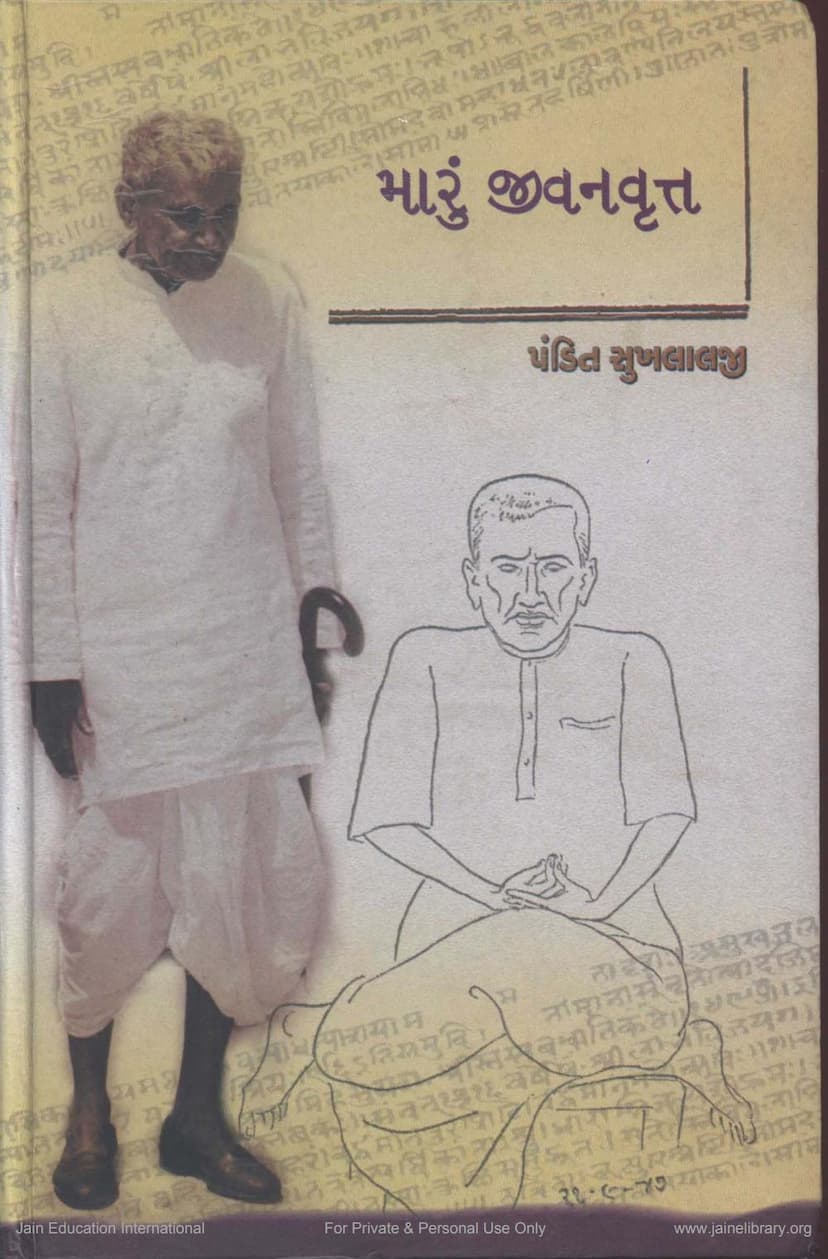Maru Jivanvrutt
Added to library: September 2, 2025

Summary
This is a comprehensive summary of the provided Jain text, "Maru Jivanvrutt" (My Autobiography) by Pandit Sukhlalji Sanghavi:
Overview:
"Maru Jivanvrutt" is the autobiography of Pandit Sukhlalji Sanghavi, a highly respected Jain scholar and philosopher of the 20th century. The book chronicles his extraordinary life, marked by profound intellectual pursuits, unwavering dedication to Jainism, simple living, and a deep love for humanity. It details his journey from a young boy who lost his sight to a world-renowned scholar who bridged the gap between different religious traditions, advocating for a religion that is practical and beneficial to society.
Key Themes and Life Events:
- Early Life and Loss of Sight: Born on December 8, 1880, Pandit Sukhlalji lost his eyesight at the age of 16 due to smallpox. He describes this as his "second birth," a turning point that, despite the physical challenge, opened new avenues for intellectual and spiritual growth.
- Quest for Knowledge: Despite his visual impairment, Sukhlalji's thirst for knowledge was immense. He pursued his studies with great determination, first in Kashi and Mithila (from 1904 to 1921), mastering Sanskrit and Indian philosophy. He later continued his studies in Kashi (1921 onwards) and engaged in extensive reading and contemplation.
- The "Maru Jivanvrutt" Narrative: The autobiography itself was a long journey. Sukhlalji began dictating it in 1946, covering events up to 1921. He later felt the need to re-structure it, but unfortunately, could not complete the narrative of his later life. The current published version, edited by his devoted disciple Dalsukh Malvania, covers up to the year 1921.
- Focus on Intellectual and Spiritual Development: The early chapters delve into his family background, schooling, innate tendencies, religious upbringing, and social observations. He highlights his self-reliance, humility, love for adventure, and an insatiable curiosity that drove his intellectual journey.
- Encounter with Different Traditions: Sukhlalji's life involved significant interactions with various religious and philosophical traditions. He learned from Jain monks and nuns, observed the practices of Swetambara and Digambara traditions, and later developed an appreciation for the philosophical underpinnings of even seemingly contradictory practices. His encounter with the teachings of Swami Vivekananda and later, his studies in Indian philosophy, broadened his perspective.
- Critique of Societal and Religious Practices: Throughout his narrative, Sukhlalji offers insightful critiques of societal norms, including the caste system, the practice of meaningless rituals, and the prevalence of hypocrisy within religious circles. He observed the blind adherence to traditions and the detrimental impact of internal conflicts within religious communities.
- The "Second Birth" in Kashi: His move to Kashi marked a significant phase. Despite initial challenges in finding suitable accommodation and teachers, his determination led him to study under esteemed scholars like Pandit Ambādatt Shastri and Pandit Harinarayan Tiwari. He particularly emphasizes the value of studying under Pandit Tiwari for his mastery of Hemachandra's grammar, which proved instrumental for his later work.
- "Sanmati" and the Beginning of His Scholarly Work: His intellectual journey took a crucial turn in Kashi with the undertaking of "Sanmati," a critical edition and translation of Jain texts. This project, along with others like the "Panchapratikraman" translation, marked the beginning of his significant contribution to Jain literature. He collaborated with others, like Vrajlal, on these ambitious projects.
- Experiences in Kashi, Gujarat, and Pune: The autobiography details his experiences in various places, including Kashi, where he navigated the complexities of the Jain Pathshala and its administrative issues. His time in Gujarat, particularly his interactions with figures like Ramanlal Modi and his observations in Gandhi Ashram, broadened his understanding of social reform and self-reliance. His stay in Pune exposed him to the intellectual fervor of the region and led to significant academic connections.
- The Importance of Experiential Learning: Sukhlalji consistently emphasizes the value of practical experience and direct observation over blind adherence to tradition. His journey, both physical and intellectual, was marked by a relentless pursuit of truth and a desire to understand the deeper meaning behind religious and social practices.
- Literary Contributions: Beyond his autobiography, Sukhlalji was a prolific writer. He authored significant works on Jain philosophy, comparative religion, and the lives of great Jain figures like Acharya Haribhadra Suri. His writings are characterized by their depth, clarity, and balanced perspective.
- Personal Philosophy: He believed in a religion that was practical and served society. He advocated for understanding different traditions and finding common ground, rejecting narrow sectarianism. His life exemplified a harmonious blend of scholarship, simplicity, and profound humanism.
Publisher and Editions:
The book was published by Gurjar Granthratna Karyalay in Ahmedabad. The first edition was in 1980, with a reprint in 2003.
Legacy:
Pandit Sukhlalji Sanghavi is remembered as a visionary scholar who revitalized the study of Jain philosophy and literature. His autobiography offers a unique glimpse into the life of a man who, despite facing personal adversity, dedicated his life to the pursuit of knowledge and the betterment of society, leaving behind a rich legacy of intellectual and spiritual wisdom.